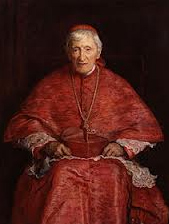Gerontius, Elgar, and the Task of Setting a Vision to Music
Edward Elgar is perhaps best known in the United States as the composer of “Pomp and Circumstance,” the tune to which our high school and college graduates regularly march on the way to the podium to receive their diplomas.
More formally, there are six “Pomp and Circumstance Marches,” and the bit used for graduations is the “Land of Hope and Glory” passage from March No. 1 of the set.
You can listen to the whole of March No. 1 here. [The part everyone knows begins at the 1:50 point in that clip, and takes up about two minutes.]
 In Britain, Elgar was for a long time the face on the twenty pound note.
In Britain, Elgar was for a long time the face on the twenty pound note.
Elgar’s musical reputation has other bases than those, though. He was, among much else, the man who set “The Dream of Gerontius” to music, and it is that I’d especially like to write about today.
Newman’s Poem
Gerontius was a poem for 35 years before it was a choral work. Indeed, it was a poem for 24 years before Elgar ever saw it: he received it in 1889 as a wedding present.
 It was the Catholic philosopher/theologian John Henry Newman who wrote Gerontius in late January and early February 1865 and it saw print later that year in the Jesuit magazine The Month.
It was the Catholic philosopher/theologian John Henry Newman who wrote Gerontius in late January and early February 1865 and it saw print later that year in the Jesuit magazine The Month.
Newman’s poem, which you can read in full here, was in some measure inspired by the work of Dante Alighieri, who portrayed himself in his Comedy as a pilgrim who had travelled through the realms of the dead: hell, purgatory, and heaven.
Newman’s character also travels in his dreamstate through the realms that may await him, and that dogmas tell us await all of us, after death. Gerontius (the word is based on the Greek phrase for “old man”) dreams that he is being guided to God by an angel.
 In the course of Newman’s poem, Gerontius receives a warning of the pain that may accompany the beatific vision.
In the course of Newman’s poem, Gerontius receives a warning of the pain that may accompany the beatific vision.
“For one moment thou shalt see thy Lord” says the angel, “One moment; but thou knowest not, my child, / What thou dost ask: that sight of the Most Fair/ Will gladden thee, but it will pierce thee too.”
Gerontius, in the protective presence of his angel, passes safely by the demons looking to gather souls for hell.
“How impotent they are! And yet on earth/ They have repute for wondrous power and skill.”
 But, as the angel had hinted, Gerontius’ soul is pained when he finally does get to see God, a sight for which he is not yet ready. He begs to be sent away, to spend time in purgatory.
But, as the angel had hinted, Gerontius’ soul is pained when he finally does get to see God, a sight for which he is not yet ready. He begs to be sent away, to spend time in purgatory.
He begs, that is, to be taken to the “lowest deep” until he is properly prepared to look at God, “and see Him in the truth of everlasting day.”
The poem ends with the angel’s assurance that that day will come, “Swiftly shall pass thy night of trial here, And I will come and wake thee on the morrow.”
Elgar’s Music
 Elgar took a somewhat shortened version of Newman’s poem as his own libretto. He showed a masterly agility at composing music that matched the multiple levels of meaning in Newman’s words.
Elgar took a somewhat shortened version of Newman’s poem as his own libretto. He showed a masterly agility at composing music that matched the multiple levels of meaning in Newman’s words.
Why am I writing of this now? Because I recently (on May 3) had the opportunity to listen to a performance of Elgar’s work, as performed by The Hartford Chorale, the Mendelssohn Choir of Connecticut, and the New Haven Symphony Orchestra, in the Cathedral of St. Joseph.
 And although Newman originally conceived of the guardian angel in his story as a man, perhaps after analogy with Dante’s spirit guide, Virgil, Elgar reconceived the role as one for a woman, a soprano.
And although Newman originally conceived of the guardian angel in his story as a man, perhaps after analogy with Dante’s spirit guide, Virgil, Elgar reconceived the role as one for a woman, a soprano.
Here’s how it was done in St. Paul’s in London, in 1997.
In Hartford, Connecticut, on May 3, 2013 the guardian angel was performed by the superb mezzo soprano Catherine Martin.
Gerontius was performed by tenor Paul-Michael Brubitzer, and a third role, that of a bass-baritone priest doing the last rites for the departing soul is sung by Douglas Williams.
The chorale and the choir between them provided 300 voices who played the supporting roles, the angels, demons, and purgatory residents that Gerontius encounters. (I’m happy to note that my own sister, Elizabeth Gemmell honorably performed her duties as one of the sopranos for the Hartford Chorale.
One of the underlying themes of the original poem is in fact the relationship between hearing and the other senses.
The Union of the Senses
At one point, Newman has his central character say: “I hear a singing; yet in sooth/ I cannot of that music rightly say/Whether I hear, or touch, or taste the tones./ Oh, what a heart-subduing melody!”
Those words were a very bold stroke on the poet’s part, I submit. Otherworldly, as the context requires, and yet thoroughly grounded in this world, in the phenomenon of synesthesia, an involuntary neurological “union of senses” that can be produced chemically, congenitally, or through a variety of accidents. For someone in a synesthetic state, motions may be perceived as sounds, colors as musical tones and so forth.
 Of course even people without a synesthetic neurological condition may use a range of metaphors that indicate a natural understanding of the possibility of such a union. We speak of “loud colors” and “red hot” spices without giving a thought to neurology.
Of course even people without a synesthetic neurological condition may use a range of metaphors that indicate a natural understanding of the possibility of such a union. We speak of “loud colors” and “red hot” spices without giving a thought to neurology.
It seems natural to think that our senses will unite into one as we approach paradise, and that recognition of their oneness will be a precursor of the final union with God.
It is pleasant and thematically appropriate at this point to note that less than three years ago, on September 19, 2010, the Roman Catholic Church beatified John Henry Newman. Beatification is the Church’s assurance that the person so recognized has entered heaven, and is often a prelude to canonization, that is, sainthood.
Housekeeping
I’d like to conclude this entry with a bit of housekeeping. Over the coming months we at JustSheetMusic will run a series of blog entries about Michael Jackson. These entries will be the work of a new member of our musical-appreciative family, Susan Darnell.
This is not at all a goodbye. My own thoughts on a variety of musical subjects will continue to grace this website. But they will be interspersed for a time with Susan’s observations about Michael Jackson (1958-2009), which will of course honor an amazing singer, composer, and songwriter, a man who helped redefine contemporary R&B, blues, pop, and rock music alike.
I look forward to her work and hope you do as well.


